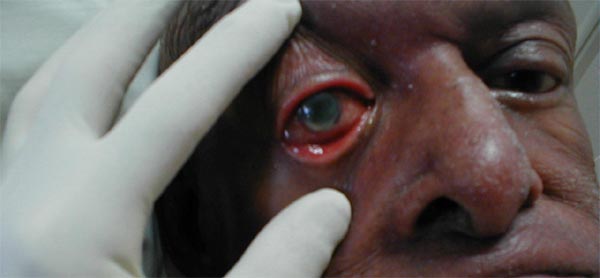Corneal ulcer
| Corneal ulcer | |
 | |
|---|---|
| Corneal ulcer. Marked generalized inflammation related to bacterial infection in this immunocompromised host. The cornea itself has become opaque secondary to this process. (Image courtesy of Charlie Goldberg, M.D.) | |
| ICD-10 | H16.0 |
| ICD-9 | 370.00 |
| MedlinePlus | 001032 MedlinePlus2 |
For patient information click here
|
Corneal ulcer Microchapters |
|
Diagnosis |
|---|
|
Treatment |
|
Case Studies |
|
Corneal ulcer On the Web |
|
American Roentgen Ray Society Images of Corneal ulcer |
Editor-In-Chief: C. Michael Gibson, M.S., M.D. [1]
Please Join in Editing This Page and Apply to be an Editor-In-Chief for this topic: There can be one or more than one Editor-In-Chief. You may also apply to be an Associate Editor-In-Chief of one of the subtopics below. Please mail us [2] to indicate your interest in serving either as an Editor-In-Chief of the entire topic or as an Associate Editor-In-Chief for a subtopic. Please be sure to attach your CV and or biographical sketch.
Overview
Historical Perspective
Pathophysiology
Epidemiology & Demographics
Risk Factors
Screening
Causes
Differentiating Corneal ulcer
Complications & Prognosis
Diagnosis
History and Symptoms | Physical Examination | Staging | Laboratory tests | Electrocardiogram | X Rays | CT | MRI Echocardiography or Ultrasound | Other images | Alternative diagnostics
Treatment
Medical therapy | Surgical options | Primary prevention | Secondary prevention | Financial costs | Future therapies
Superficial and deep corneal ulcers
Diagnosis
Diagnosis is done by direct observation under magnified view of slit lamp revealing the ulcer on the cornea. The use of fluorescein stain, which is taken up by exposed corneal stroma and appears green, helps in defining the margins of the corneal ulcer, and can reveal additional details of the surrounding epithelium. Herpes simplex ulcers show a typical dendritic pattern of staining. Rose-Bengal dye is also used for supra-vital staining purposes, but it may be very irritating to the eyes. In descemetoceles, the Descemet's membrane will bulge forward and after staining will appear as a dark circle with a green boundary, because it does not absorb the stain. Doing a corneal scraping and examining under the microscope with stains like Gram's and KOH preparation may reveal the bacteria and fungi respectively. Microbiological culture tests may be necessary to isolate the causative organisms for some cases. Other tests that may be necessary include a Schirmer's test for keratoconjunctivitis sicca and an analysis of facial nerve function for facial nerve paralysis.
Treatment
Proper diagnosis is essential for optimal treatment. Bacterial corneal ulcer require intensive fortified antibiotic therapy to treat the infection. Fungal corneal ulcers require intensive application of topical anti-fungal agents. Viral corneal ulceration caused by herpes virus may antivirals like topical acyclovir oint instilled at least five times a day. Alongside, supportive therapy like pain medications are given, including topical cycloplegics like atropine or homatropine to dilate the pupil and thereby stop spasms of the ciliary muscle. Superficial ulcers may heal in less than a week. Deep ulcers and descemetoceles may require conjunctival grafts or conjunctival flaps, soft contact lenses, or corneal transplant. Proper nutrition, including protein intake and Vitamin C are usually advised. In cases of Keratomalacia, where the corneal ulceration is due to a deficiency of Vitamin A, supplementation of the Vitamin A by oral or intramuscular route is given. Drugs that are usually contraindicated in corneal ulcer are topical corticosteroids and anesthetics - these should not be used on any type of corneal ulcer because they prevent healing, may lead to superinfection with fungi and other bacteria and will often make the condition much worse.
Refractory corneal ulcers
Refractory corneal ulcers are superficial ulcers that heal poorly and tend to recur. They are also known as indolent ulcers or Boxer ulcers. They are believed to be caused by a defect in the basement membrane and a lack of hemidesmosomal attachments. They are recognized by undermined epithelium that surrounds the ulcer and easily peels back. Refractory corneal ulcers are most commonly seen in diabetics and often occur in the other eye later. They are similar to Cogan's cystic dystrophy.
Treatment
Topical fortified antibiotics are used at hourly intervals to treat infectious corneal ulcers. Cycloplegic eye drops are applied to give rest to the eye.Pain medications are given as needed. Loose epithelium and ulcer base can be scraped off and sent for culture sensitiviy studies to find out the pathogenic organism. This helps in choosing appropriate antibiotics. Complete healing takes anywhere from about few weeks to few months.
Refractory corneal ulcers can take a long time to heal, sometimes months. In case of progressive or non-healing ulcers, surgical intervention by an Ophthalmologist with corneal transplantation may be required to save the eye. In all corneal ulcers it is important to rule out predisposing factors like Diabetes Mellitus and Immunodeficiency.
Melting ulcers
Melting ulcers are a type of corneal ulcer involving progressive loss of stroma in a dissolving fashion. This is most commonly seen in Pseudomonas infection, but it can be caused by other types of bacteria or fungi. These infectious agents produce proteases and collagenases which break down the corneal stroma. Complete loss of the stroma can occur within 24 hours. Treatment includes antibiotics and collagenase inhibitors such as acetylcysteine. Surgery in the form of corneal transplantation (penetrating keratoplasty) is usually necessary to save the eye.